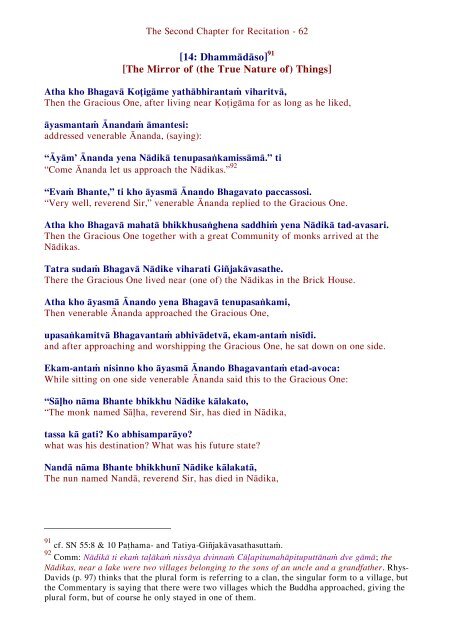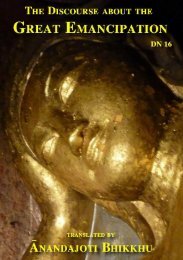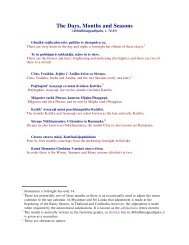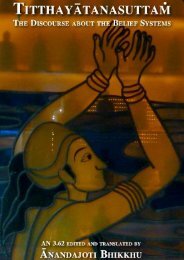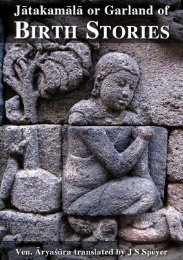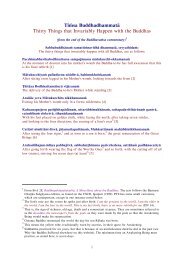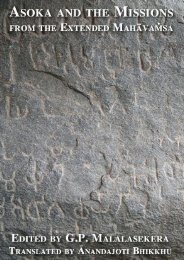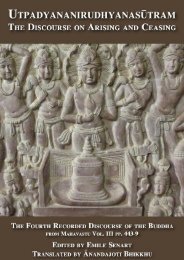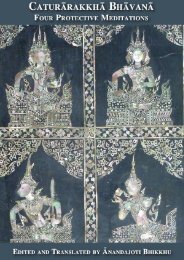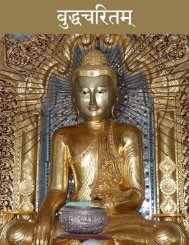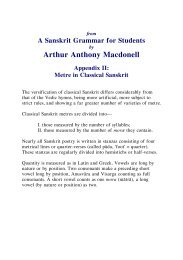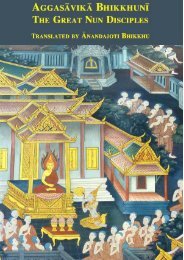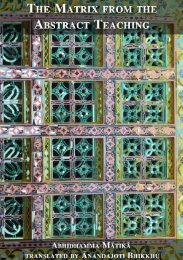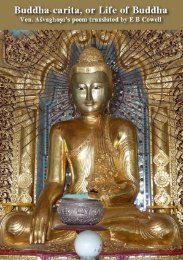Mahaparinibbanasuttam (DN 16) - Ancient Buddhist Texts
Mahaparinibbanasuttam (DN 16) - Ancient Buddhist Texts
Mahaparinibbanasuttam (DN 16) - Ancient Buddhist Texts
You also want an ePaper? Increase the reach of your titles
YUMPU automatically turns print PDFs into web optimized ePapers that Google loves.
The Second Chapter for Recitation - 62<br />
[14: Dhammādāso] 91<br />
[The Mirror of (the True Nature of) Things]<br />
Atha kho Bhagavā Koṭigāme yathābhirantaṁ viharitvā,<br />
Then the Gracious One, after living near Koṭigāma for as long as he liked,<br />
āyasmantaṁ Ānandaṁ āmantesi:<br />
addressed venerable Ānanda, (saying):<br />
“Āyām’ Ānanda yena Nādikā tenupasaṅkamissāmā.” ti<br />
“Come Ānanda let us approach the Nādikas.” 92<br />
“Evaṁ Bhante,” ti kho āyasmā Ānando Bhagavato paccassosi.<br />
“Very well, reverend Sir,” venerable Ānanda replied to the Gracious One.<br />
Atha kho Bhagavā mahatā bhikkhusaṅghena saddhiṁ yena Nādikā tad-avasari.<br />
Then the Gracious One together with a great Community of monks arrived at the<br />
Nādikas.<br />
Tatra sudaṁ Bhagavā Nādike viharati Giñjakāvasathe.<br />
There the Gracious One lived near (one of) the Nādikas in the Brick House.<br />
Atha kho āyasmā Ānando yena Bhagavā tenupasaṅkami,<br />
Then venerable Ānanda approached the Gracious One,<br />
upasaṅkamitvā Bhagavantaṁ abhivādetvā, ekam-antaṁ nisīdi.<br />
and after approaching and worshipping the Gracious One, he sat down on one side.<br />
Ekam-antaṁ nisinno kho āyasmā Ānando Bhagavantaṁ etad-avoca:<br />
While sitting on one side venerable Ānanda said this to the Gracious One:<br />
“Sāḷho nāma Bhante bhikkhu Nādike kālakato,<br />
“The monk named Sāḷha, reverend Sir, has died in Nādika,<br />
tassa kā gati? Ko abhisamparāyo?<br />
what was his destination? What was his future state?<br />
Nandā nāma Bhante bhikkhunī Nādike kālakatā,<br />
The nun named Nandā, reverend Sir, has died in Nādika,<br />
91 cf. SN 55:8 & 10 Paṭhama- and Tatiya-Giñjakāvasathasuttaṁ.<br />
92 Comm: Nādikā ti ekaṁ taḷākaṁ nissāya dvinnaṁ Cūḷapitumahāpituputtānaṁ dve gāmā; the<br />
Nādikas, near a lake were two villages belonging to the sons of an uncle and a grandfather. Rhys-<br />
Davids (p. 97) thinks that the plural form is referring to a clan, the singular form to a village, but<br />
the Commentary is saying that there were two villages which the Buddha approached, giving the<br />
plural form, but of course he only stayed in one of them.


